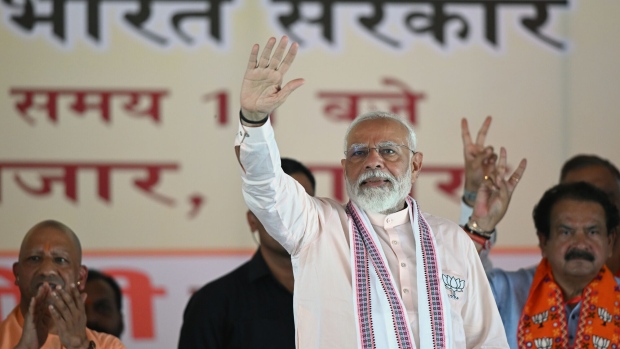Modi Vows to Replace Religion-Based Laws if He Returns to Office
, Bloomberg News

(Bloomberg) -- Sign up for the India Edition newsletter by Menaka Doshi – an insider's guide to the emerging economic powerhouse, and the billionaires and businesses behind its rise, delivered weekly.
Prime Minister Narendra Modi reaffirmed his pledge to replace India’s religion-based marriage and inheritance laws with a uniform civil code if he returns to office for a third term, a move that some minority groups have opposed.
In an interview with the Times of India listing his agenda, Modi said his government would push for making the code a reality.
“It is clear that separate laws for communities are detrimental to the health of society,” he said. “We cannot be a nation where one community is progressing with the support of the Constitution while the other community is stuck in a time warp due to appeasement.”
Previous governments have stayed away from amending the religious and customary laws that govern India largely for fear of angering voters — the majority Hindu as well as minority Christian and Muslim groups — as it could potentially clash with their right to practice their faith.
Modi’s government hasn’t released any proposals on how it plans to change the current laws, but some minority groups have raised concerns that it may target Muslims. Creating a new civil code has featured prominently in Modi’s Bharatiya Janata Party election manifestos in the last two national elections and remains a key but unfulfilled part of its Hindu nationalist agenda.
Modi is seeking to extend his decade in power by another five years in elections that began April 19 and will run until June 1. Results are expected on June 4.
The prime minister also reiterated in the interview a pledge to have simultaneous local and national polls, under the slogan ‘one nation-one election.’ The BJP has long pushed to have concurrent elections as a way to cut down costs, although opposition groups have said it goes against India’s current federal system.
Modi also responded to allegations from the opposition that recent comments he made on the campaign trail were religiously divisive. He said he was calling out the policies of the Indian National Congress, the main opposition, which favor affirmative action for some groups.
“To show that Congress violated the Constitution by enacting laws to provide reservations on the basis of religion is not polarization,” Modi argued.
Read more: India’s Six-Week Election Is a Test of Modi’s Power: QuickTake
The prime minister also responded to a debate last week sparked by a Congress official’s comments about using an inheritance tax to redistribute wealth.
“I do not think they are solutions by any stretch of imagination. These are actually dangerous problems disguised as solutions,” Modi said. “Would you work day and night if the government would take away your money at the end in the name of redistribution?”
To boost growth, the government needs to remove barriers and empower people, the prime minister said. “This unleashes their entrepreneurial potential as we have seen in our country,” he said.
--With assistance from Swati Gupta.
©2024 Bloomberg L.P.
No comments:
Post a Comment